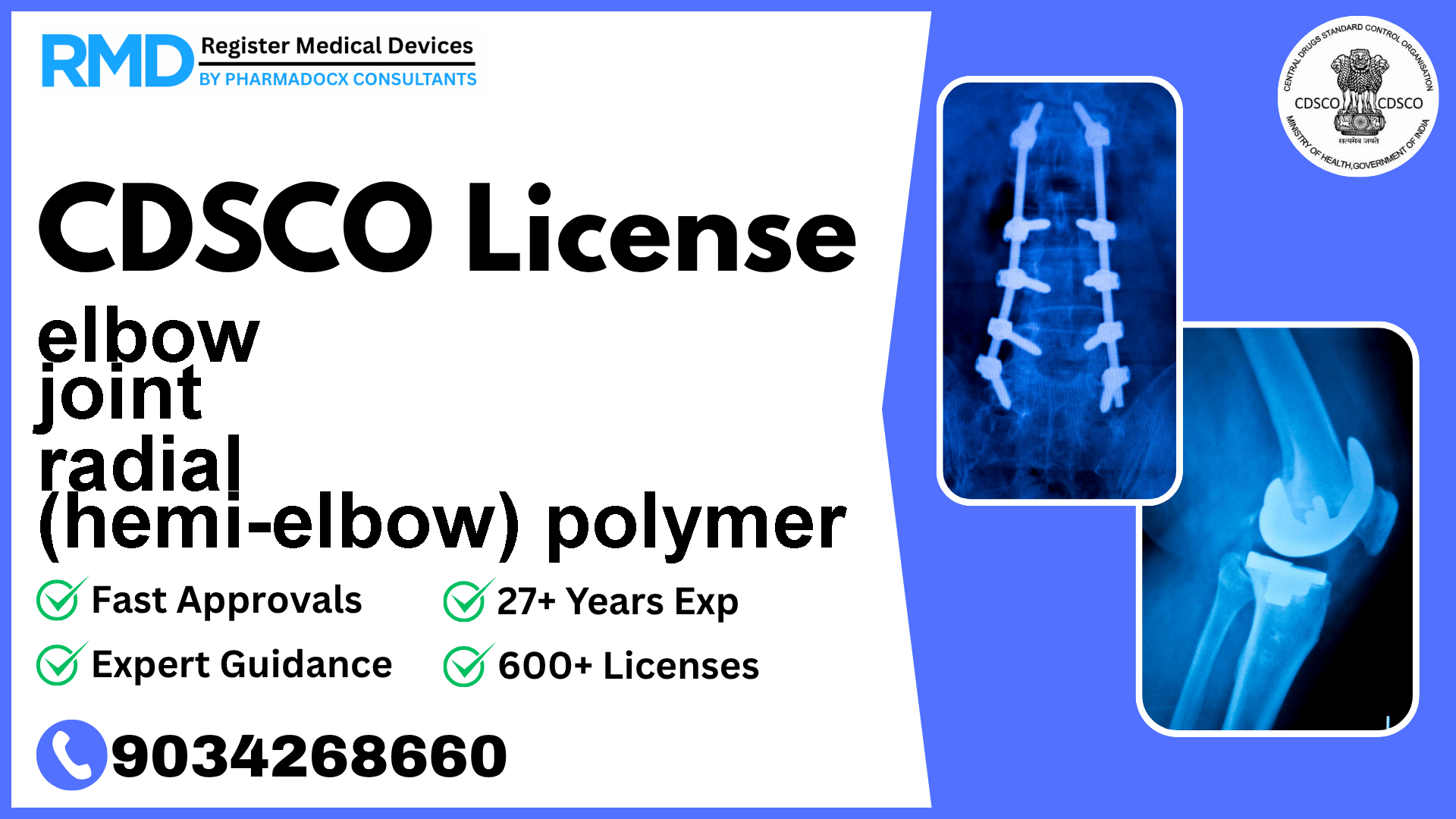CDSCO License for elbow joint radial (hemi-elbow) polymer
Medical Device Information
Intended Use
An elbow joint radial (hemi-elbow) polymer prosthesis is a device intended to be implanted made of medical grade silicone elastomer used to replace the proximal end of the radius.

Comprehensive Guide to CDSCO Licensing for Elbow Joint Radial (Hemi-Elbow) Polymer Prosthesis (Class C)
With over 25 years of experience assisting more than 500 medical device manufacturers and importers, we understand the nuances of obtaining regulatory approvals in India. The elbow joint radial (hemi-elbow) polymer prosthesis, a Class C orthopaedic implant, demands meticulous compliance with the Central Drugs Standard Control Organization (CDSCO) framework to ensure safe market access.
Understanding Your Device and Regulatory Importance
The elbow joint radial (hemi-elbow) polymer prosthesis is a sophisticated medical implant made from medical-grade silicone elastomer designed to replace the proximal end of the radius. Its classification as a Class C device under the CDSCO regulatory framework highlights its moderate to high risk, necessitating strict oversight. Compliance ensures patient safety, legal market entry, and builds trust with healthcare providers.
CDSCO Regulatory Framework for Orthopaedic Implants
Orthopaedic implants fall under the purview of CDSCO’s medical device regulations, which are aligned with global standards to ensure quality and safety. For Class C devices like the hemi-elbow polymer prosthesis, the MD9 manufacturing license from the Central Licensing Authority is mandatory. Importers require an MD15 import license if sourcing from outside India.
Risk Classification and License Requirements for Your Device
According to the CDSCO notification 29/Misc/3/2017-DC (292) dated 06.06.2018, the elbow joint radial polymer prosthesis is classified as Class C, due to its implantable nature and associated risk profile. This classification mandates:
- MD9 License (Form MD7) for manufacturing
- MD15 License (Form MD14) for importers
You can review detailed classification guidelines on the Medical Device Classification page.
Step-by-Step Manufacturing License Process (MD9 License)
- Apply for Test License (Form MD13): Before full manufacturing approval, a test license is required, taking approximately 1.5 to 2 months to be granted.
- Product Testing: Conduct product testing at CDSCO-approved laboratories listed on the Testing Laboratories portal.
- Documentation Preparation: Compile comprehensive technical documents including Device Master File (DMF), Plant Master File (PMF), Essential Principles Checklist, Risk Management File, and QMS records.
- Submit Manufacturing License Application (Form MD7): File your application on the CDSCO MD Online Portal.
- Audit by CDSCO Inspectors: Expect a thorough inspection covering manufacturing premises, quality systems, and documentation.
- Resolution of Queries: Address any clarifications or deficiencies raised by CDSCO.
- Grant of License (Form MD9): Upon satisfactory compliance, the manufacturing license is issued.
The entire process typically spans 4 to 5 months.
Essential Documents Required for MD9 License
- Company Constitution or Incorporation Certificate
- Proof of Premises Ownership or Lease Agreement
- Technical Staff Qualifications and Details
- Fire and Pollution No Objection Certificates (NOCs)
- Device Master File (DMF): Detailed design, formulation, and manufacturing processes (Device Master File Guide)
- Plant Master File (PMF): Facility layout, equipment, and quality controls (Plant Master File Guide)
- Essential Principles Compliance Checklist
- Risk Management File demonstrating hazard analysis and mitigation (Risk Management)
- Test Reports from CDSCO-approved laboratories
- Product Labels and Instructions for Use (IFU)
- Quality Management System (QMS) Documentation, preferably ISO 13485 certified
Import License Process (MD15 License) for Class C Devices
For importers, the MD15 license from the Central Licensing Authority is mandatory and involves:
- Documentation Preparation: Gather manufacturing license, Free Sale Certificate, ISO 13485:2016, CE Certificate, DMF, PMF, Wholesale license, and Company Constitution.
- Application Submission: File the Form MD14 application via the CDSCO MD Online Portal.
- Query Resolution: Respond promptly to any departmental queries.
- License Issuance: Typically completed within 5 to 6 months.
Timeline and Processing Duration Summary
| License Type | Processing Time | Key Steps |
|---|---|---|
| MD13 Test License | 1.5 - 2 months | Application, testing approval |
| MD9 Manufacturing | 4 - 5 months | Test license, audit, approval |
| MD15 Import License | 5 - 6 months | Document approval, license grant |
Government Fees and Cost Structure
MD9 License Fees:
- Application Fee: ₹50,000
- Per Product Fee: ₹1,000
MD15 Import License Fees for Class C:
- Site Fee: $3,000
- Per Product Fee: $1,500
Budgeting for these fees upfront helps avoid delays. Note that additional costs for testing, notified body audits, and consultancy may apply.
Common Challenges and Practical Solutions
- Delays in Test License Approval: Engage early with CDSCO and ensure all test license documentation is complete to mitigate delays.
- Incomplete Documentation: Utilize comprehensive checklists like those in our MD9 License Guide to prepare all required files.
- Audit Non-Compliance: Pre-audit your facilities and processes against notified body standards found on the Notified Bodies List.
- Query Resolution Delays: Assign dedicated regulatory personnel or consultants to promptly address queries.
Expert Consultation and Support
Our extensive experience with over 500 successful CDSCO license applications allows us to provide tailored support from documentation to audit readiness. We assist in preparing your Device Master File, Plant Master File, risk management plans, and facilitate communication with CDSCO.
Getting Started with Your CDSCO License Application
- Assess Device Classification: Confirm your device’s Class C status and regulatory requirements.
- Initiate Test License Application: Prepare documents and submit Form MD13 to start the process.
- Engage Approved Testing Labs: Schedule product testing with CDSCO-recognized labs from the Testing Laboratories list.
- Compile Complete Documentation: Use our guides to develop your DMF, PMF, and Risk Management File.
- Plan for Audit: Review notified body requirements early and schedule pre-audit assessments.
- Submit Manufacturing License Application on CDSCO Portal: Apply via the CDSCO MD Online Portal and track application status.
Partnering with an experienced consultant can streamline this process, reduce risks of rejection, and accelerate your time to market. Contact us to leverage our expertise and ensure your elbow joint radial (hemi-elbow) polymer prosthesis gains timely CDSCO approval.